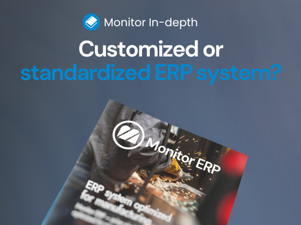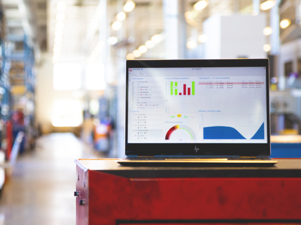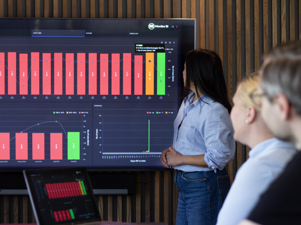Four key success metrics for ERP implementation
Implementing an ERP system in current times need not be a complicated and time-consuming endeavor, especially with Monitor ERP which can be implemented in a matter of months. However, it is also important to measure the success of your ERP implementation. There are many key performance indicators (KPIs) which you can measure but we feel that the below are essential success metrics that you should start with:
ENHANCED CUSTOMER EXPERIENCE
As the famous quote by Harvard Business School Professor Theodore Levitt goes “People don't want to buy a quarter-inch drill. They want a quarter-inch hole!”. The same applies for ERP systems, you don’t want another piece of software sitting on your enterprise-class server collecting virtual dust, you want to enhance the experience of your customers, new and old alike.
An ERP system organizes, consolidates and streamlines business resources, which leads to improved overall business functions from the shop floor to the top floor. Accurate data, synchronized communications between departments, suppliers and customers result in smooth processing of manufacturing, purchase and sales orders.
When you are able to deliver customer orders on time, you are improving their experience. Do this consistently and you will have not just happy customers, but loyal customers who may also become your ambassadors.
Consistency is essential to keeping customers happy, as you may easily lose a customer if their order is not delivered on time and your team does not handle the situation effectively. The best way you can measure customer experience is by listening to them. You may also want to search for reviews and comments online or directly send surveys to them to collect feedback. Measuring the number of new customers, you are gaining and how many customers you are retaining is also a good indicator of customer satisfaction.
INCREASED PROFITS WITH BETTER MARGINS
One of the major expectations from an ERP system is whether it will be able to increase profits for the business. This can be a good yardstick for you to measure the success of your ERP implementation.
ERP systems automate processes which in turn lowers labor cost. As work efficiency increases, your staff can achieve more in the same amount of time. Imagine increasing your production rate using the same setup and time, what would that mean for your business?
Besides making production and business processes more efficient, ERP systems can help you make better decisions too. This is inadvertently true when it comes to product pricing, with a centralized supplier database, it is easy to track the performance of each supplier based on their delivery reliability, and costing. This allows purchasers to choose the right suppliers for the job and negotiate better prices.
If used correctly, you can set optimized margins based on real-time production costing data coupled with improved supplier costing, expect to see increased profit margins. Being able to sell at the right price will not only ensure you secure more contracts but also makes sure that your profit margins are well optimized across different customers.
Some of the metrics you can track are number of invoices and orders, expenses, labor, materials etc. We are confident you will see positive gains in this area that will more than justify the investment made for an ERP system.
REAL-TIME DATA
In today’s fast paced market, decisions need to be made quickly and accurately. Without accurate data, many business owners, managers and executives are making decisions based on gut feeling instead of facts and figures.
As such, implementing an ERP system can hep you communicate consistently across departments, ensuring that everyone is on the same page and making decisions based on a single source of data. Having accurate data is crucial to making well-informed decisions and is just the first step towards digitalization and automation to keep up with the Industry 4.0 Revolution.
Monitor Machine Integration and its built in Business Intelligence captures real-time machine operation data and provides manufacturers with OEE (Overall Equipment Effectiveness) scores that enables continuous systematic improvement to manufacturing processes.
Machine downtime is costly to manufacturers, ERP systems with Machine Integration and Business Intelligence are able to show you the health status of your machines, allowing for timely routine maintenance to be run. With that, you can minimize downtime and serious machine failure due to ill-maintained machines.
Knowing accurate production capacities, machine operating status and maintenance schedules allows you to set realistic expectations for customers that results in improved customer relationships.
The amount of machine downtime you successfully decrease is one of the major key metrics that you should be measuring in relation to this area of ERP implementation success.
REDUCE MATERIAL COST
Do you often find yourself purchasing more material than you actually need? It happens when purchasers do not have accurate data from other departments and are unclear of process cycle time. To play it safe, it is often common practice to overbuy than to risk having production lines go down due to material shortage.
This usually results in excess inventory and if your inventory turnover is low, additional wastage in storage space and cost is also expected.
However, with the power of your ERP system’s unified communications and SRM (Supplier Relationship Management) capabilities, you can better plan the materials needed and order just the right amount at the right time.
Modern ERP systems have supplier performance management capabilities that can help you identify the best suppliers to purchase from based on pricing, and delivery reliability. You can easily know if a particular supplier is costing you too much money and take immediate action to either negotiate better terms with them or to look for a cheaper source.
By measuring the amount of material cost that was successfully reduced is a key metric that you should be tracking as part of your ERP implementation project.
IS YOUR ERP IMPLEMENTATION SUCCESSFUL?
It does not matter whether you are in the process of selecting the right ERP system for your business or have already implemented one. The question remains, whether it was worth the time and money spent (or going to spend)? Are you seeing improvements to your business processes or turning your books from red to black?
An ERP system is a tool, and like any tool, it needs to match the job that needs to be done. However, more importantly, it needs to be used properly in order for the job to be completed without any bruised thumbs.
Monitor offers a modern, state-of-the-art ERP system that covers all aspects of manufacturing businesses from the production to sales, warehousing, purchasing as well as finance. It comes packaged in a user-friendly user interface and is supported by highly experienced business consultants.
You see, when you make Monitor your technology partner, you don’t just get an ERP system; you are gaining a partner that boasts over 40 years of manufacturing experience that can guide you to level up your manufacturing and business processes.
Request for a FREE consultation here and share with us your vision for your company’s future.






